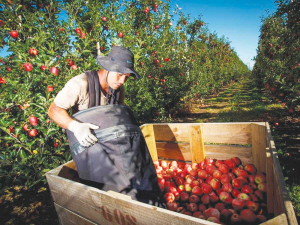Organic dairy co-op files for liquidation
A co-operative touted as New Zealand's only 100% farmer-owned organic milk producer has gone bust.
 “The report says many in the primary sector will need to mechanise some of the highly physical processes required as part of producing food and fibre.”
“The report says many in the primary sector will need to mechanise some of the highly physical processes required as part of producing food and fibre.”
Industries that depend on migrant labour – like many in NZ’s primary sector – will need to find alternatives, according to a new report.
The need for alternatives is one of the key findings of the latest report on the agribusiness sector by KPMG in the wake of the Covid-19 pandemic. The recently released 2020 KPMG Agribusiness Agenda says that there is a stigma attached to a career in the production and processing of food and fibre products.
“The jobs are seen as being low skilled, low paid roles which are done by those for which there are no other employment options,” the report says. “While such perceptions are a million miles away from the truth, they have made it difficult for organisations to recruit the labour force they need, even in countries with significant levels of unemployment.”
Lead author of the report – KPMG’s head of global agribusiness – Ian Proudfoot says travel restrictions will present challenges to those industries that place significant reliance on transitory labour – be that foreign migrants or people taking working holidays or gap years.
“If borders are closed and travel is less free and significantly more expensive, it will mean transitory labour will not be available to organisations, requiring them to rethink their resourcing strategies,” he explains.
“The probable lift in unemployment levels around the world will also see an expectation being placed on organisations to make efforts to employ locals whenever possible.”
Proudfoot believes that this will be a big challenge and require careful management.
“Trying to fit the newly unemployed workforce into vacancies in primary production sectors will be akin to fitting square pegs into round holes,” he adds. “The immediate impact of the pandemic on labour availability, in particular the loss of seasonal and migrant labour, has required some businesses to prioritise available resources to process volume at the expense of producing premium products that require more time and specialist handling.”
Proudfoot believes many in the primary sector will need to prioritise the opportunity to mechanise some of the highly physical processes required as part of producing food and fibre, which he claims has not been done in the past.
“The availability of relatively low-cost migrant and casual labour has reduced the incentive to accelerate commercialisation,” he adds. “With the structural changes to labour availability, the pandemic will create the incentive to develop robotic and mechanised solutions to some of the physical labour challenges which now exist.”
However, the report notes that while some premium activities may be able to be mechanised in future, the reality is that people with the right skills will continue to be required if market premiums are not sacrificed in future seasons.
“The gap year student yearning for some pocket money, the research scientist seeking overseas experience, the migrant dairy worker looking to create a better future for their family or the winemaker travelling the world to participate in vintage have all contributed to the success of New Zealand’s agri-food sector,” it says.
“The border restrictions in place mean these labour resources are not available to the industry in the short to medium term, requiring alternatives to be found if the sector is to continue to grow, particularly in light of the productivity impacts social distancing requirements will have on businesses for the foreseeable future.”
Proudfoot believes there is a need for a public/private alliance to establish pathways that enable unemployed New Zealanders to take up opportunities in the primary sectors, including providing retraining and relocation support.
Trade Minister Todd McClay says New Zealand has no intention of backing down in a trade dispute with Canada over dairy products.
There have been leadership changes at the Hamilton-based Dairy Goat Co-operative, which has been struggling financially in recent years.
Horticulture NZ chief executive Nadine Tunley will step down in August.
OPINION: In recent years farmers have been crying foul of unworkable and expensive regulations.
Another 16 commercial beef farmers have been selected to take part in the Informing New Zealand Beef (INZB) programme designed to help drive the uptake of genetics in the industry.
Trade Minister Todd McClay says Kiwi exporters will be $100 million better off today as the NZ-EU Free Trade Agreement (FTA) comes into force.

OPINION: The new government has clearly signalled big cuts across the public service.
OPINION: Your canine crusader is not surprised by the recent news that New Zealand plant-based ‘fake meat’ business is in…